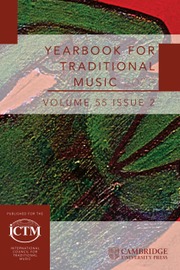Article contents
Soldier-Musicians in an Australian Army Band: Understanding the Lived Experience of Gender
Published online by Cambridge University Press: 07 March 2019
Extract
When you realize her [Athens'] greatness, then reflect that what made her great was men with a spirit of adventure, men who knew their duty, men who were ashamed to fall below a certain standard. From Pericles’ Funeral Oration of 431/0 BC
Perhaps I should say a word or two on the duties of women to those among you who are now widowed. I can say all I have to say in a short word of advice. Your great glory is not to be inferior to what God had made you, and the greatest glory of a women is to be least talked about by men, whether they are praising you or criticizing you.
From Pericles’ Funeral Oration of 431/0 BC
For the sake of those who have fought and died In your King and country's name, Come, play the MAN, ere it be too late, and take a hand in the game. Mary L. Wyatt, in The Australian Band News, 26 July 1915
- Type
- Articles
- Information
- Copyright
- Copyright © 1996 By The International Council for Traditional Music
Footnotes
An earlier version of this paper was read by the author at a meeting of the Gender and Music Study Group of the International Council for Traditional Music in Punat, Croatia, in September 1996.
This paper is a report on a study which grows out of my ethnomusicological doctoral research project (Bannister 1996) in which I examine the construction of the world views of the soldier-musicians of the Australian Army Band, Kapooka. The project used a participant observer methodology. I worked as a civilian, guest member of the Band's trombone section from August to November 1989, and since then as an occasional participant and observer. I made field notes and interview transcripts in the anthropological tradition, which I analysed in a process derived from grounded theory (Glaser and Strauss 1967) in the light of more recent work on qualitative data analysis by Wolcott (Wolcott 1994) and Eisner (Eisner 1991). My work falls clearly into Anne Dhu Shapiro's (Shapiro 1991:6) ‘cultural anthropology applied to music,’ category.
I am grateful to Charles Sturt University for its support for my research, and for making the writing and presentation of this report possible. I wish to thank my colleague, Dr. John Retallick, and two anonymous reviewers for the YTM, for their valuable comments and suggestions on drafts of this paper.
References
References Cited
- 1
- Cited by


